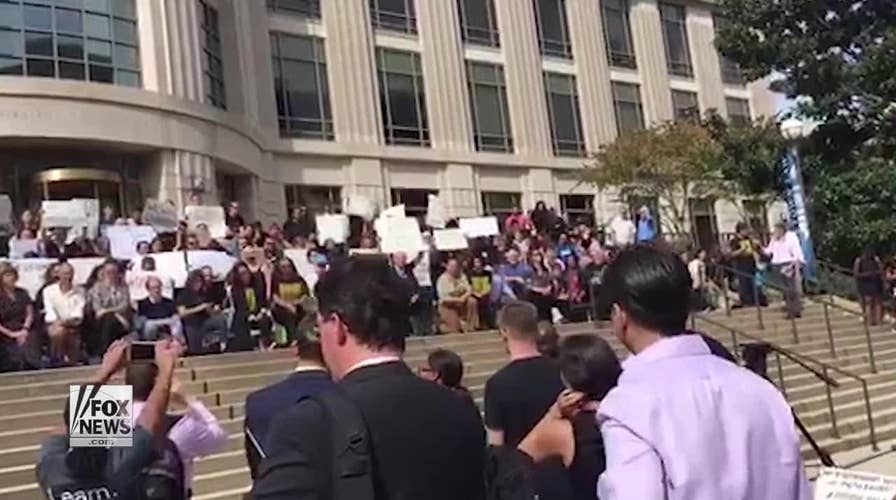Georgetown students protest Jeff Sessions by ‘taking a knee’
Dozens of students and faculty at Georgetown University Law Center 'took a knee' on Tuesday to protest Attorney General Jeff Sessions' address about free speech on campus
Let’s suppose it is October 1, 1962 in Oxford, Mississippi. With enormous controversy and world-wide news coverage, one James Meredith, the first black student ever to have been admitted to the University of Mississippi, has just enrolled. The campus of Ole Miss, as it is known, and the town of Oxford are in uproar, and nearly 30,000 U.S. troops, federal marshals and national guardsmen, called out by President John F. Kennedy, are on campus to try to keep the peace and to escort Meredith to class. Two people are dead as a result of the violence, and over 300 injured.
A few students and professors supported Meredith’s enrollment, but most believed that segregation was the status quo and the politically correct position, at least in Mississippi, and that talk about integration was distasteful and upsetting to their sensibilities.
So let us further suppose that Ole Miss has a speech code – the sort of speech code that many colleges and universities across the country have adopted – something like the one in place at Clemson University in South Carolina, which bans any verbal or physical act that creates an “offensive educational, work or living environment.” Because standards as to just what is offensive don’t exist, Ole Miss officials use the speech code to ban any talk or act that supports integration, racial equality or civil rights protections.
Predictably, and not unlike Ole Miss professors who participated in the demonstrations against James Meredith’s enrollment at their university, several Georgetown Law School professors protested Sessions’ speech, even taking a knee in front of the building where he spoke.
Of course in 1962 Ole Miss did not need to hide behind a speech code, as university administrations do today. Ole Miss officials, backed up by the State of Mississippi, banned offensive verbal and physical acts that supported James Meredith because, as far as they were concerned, it was the right thing to do. And besides, there wasn’t much question that Meredith’s enrollment was creating an “offensive educational, work or living environment.”
Luckily for Mr. Meredith and for the civil rights movement, JFK’s Attorney General, his brother Robert Kennedy, did not stand idly by but instead brought the full force of the Justice Department, including its newly-minted Civil Rights Division, to Mississippi to enforce the U.S. Constitution. The rest, as they say, is history.
Attorney General Jeff Sessions, former Senator from Alabama, went to Georgetown University two weeks ago to deliver a thoughtful speech about the importance of protecting free speech on college and university campuses – no matter how unpopular it may be – and against the too-often prevailing view that banning what some deem unpleasant is justified in today’s politically correct world.
Sessions was particularly critical of college administrators who silence speech they disagree with by permitting what he called the “heckler’s veto.” Here, said Sessions, “the school favors the heckler’s disruptive tactics over the speaker’s First Amendment rights,” allowing protestors to silence those with whom they disagree. He reminded the audience of the wise words of Supreme Court Justice Robert Jackson, who said of the First Amendment, “If there is a fixed star in our constitutional constellation, it is that no official, high or petty, can prescribe what shall be orthodox in politics, nationalism, religion, or other matters of opinion.”
Although free speech is a necessary element of any free society, Sessions stressed that it is particularly important in the academic community, where “the university is supposed to be the place where we train virtuous citizens. It is where the next generation of Americans is equipped to contribute to and live in a diverse and free society filled with many, often contrary, voices.
Predictably, and not unlike Ole Miss professors who participated in the demonstrations against James Meredith’s enrollment at their university, several Georgetown Law School professors protested Sessions’ speech, even taking a knee in front of the building where he spoke. Although they insisted Sessions had the right to speak, it is a little hard to believe that they would not have been pleased had Sessions been subjected to the heckler’s veto.
And not unlike Bobby Kennedy in Mississippi in 1962, Attorney General Sessions announced that the Department of Justice would not stand idly by while college and university officials practice such abuses to the Constitution, but would “do its part in this struggle. We will enforce federal law,” Sessions said, and “defend free speech, and protect students’ free expression from whatever end of the political spectrum it may come.” It should be no surprise that Department of Justice officials believe that Constitutional rights should be enforced. Perhaps we should be surprised that until now, at least in academia, they have not been.
My guess is that were Bobby Kennedy alive today, he would have wholeheartedly supported Jeff Sessions.

